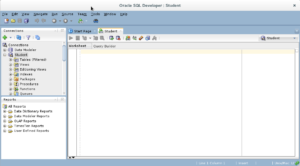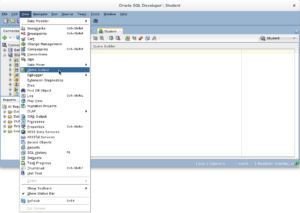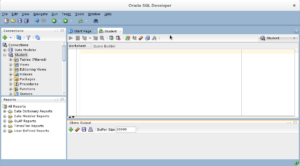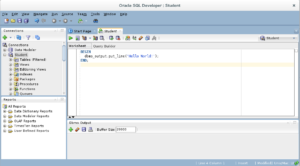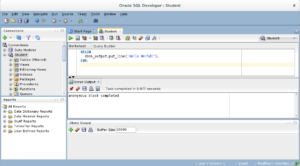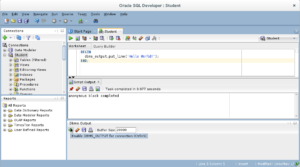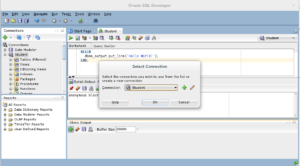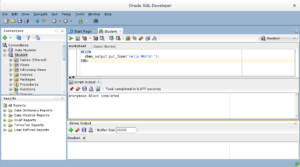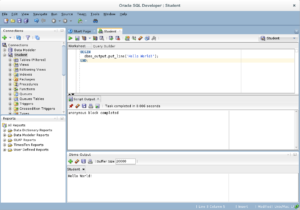Archive for the ‘Oracle 12c’ Category
DB_LINK w/o tnsnames.ora
A question popped up, which I thought was interesting. How can you create a DB_LINK in Oracle without the DBA changing the tnsnames.ora file? It’s actually quite easy, especially if the DBA sets the TNS address name the same as the instance’s service name or in older databases SID value.
- Do the following with the
tnspingutility:tnsping mohawk
It should return this when the server’s
hostnameismohawkand domain name istechtinker.com:TNS Ping Utility for Linux: Version 11.2.0.2.0 - Production on 26-JUL-2016 16:55:58 Copyright (c) 1997, 2011, Oracle. All rights reserved. Used parameter files: Used TNSNAMES adapter to resolve the alias Attempting to contact (DESCRIPTION = (ADDRESS = (PROTOCOL = TCP)(HOST = mohawk.techtinker.com)(PORT = 1521)) (CONNECT_DATA = (SERVER = DEDICATED) (SERVICE_NAME = ORCL))) OK (10 msec)
- You can now create a
DB_LINKin another Oracle instance without atnsnames.oraentry by referencing the type of server connection and service name with the following syntax (please note that you should remove extraneous white space):CREATE DATABASE LINK test CONNECT TO student IDENTIFIED BY student USING '(DESCRIPTION=(ADDRESS=(PROTOCOL=tcp)(HOST=mohawk.techtinker.com)(PORT=1521))(CONNECT_DATA=(SERVER=DEDICATED)(SERVICE_NAME=ORCL)))'
In an older database version, you may need to refer to the
SID, like this:CREATE DATABASE LINK test CONNECT TO student IDENTIFIED BY student USING '(DESCRIPTION=(ADDRESS=(PROTOCOL=tcp)(HOST=mohawk.techtinker.com)(PORT=1521))(CONNECT_DATA=(SERVER=DEDICATED)(SID=ORCL)))'
Then, you can query a contact table in the remote instance like this:
SELECT COUNT(*) FROM contact@test;
As always, I hope this helps somebody trying to solve a problem.
Can’t Display 256 Colors
If you’re reading this post, you most likely are trying to run the Oracle Database 11g or 12c runInstaller program, and it’s failing a critical dependency check and displaying an error like the one below. If so, choose n because if you choose y it won’t launch the Oracle Installer.
Starting Oracle Universal Installer...
Checking Temp space: must be greater than 500 MB. Actual 30824 MB Passed
Checking swap space: must be greater than 150 MB. Actual 3967 MB Passed
Checking monitor: must be configured to display at least 256 colors
>>> Could not execute auto check for display colors using command /usr/bin/xdpyinfo. Check if the DISPLAY variable is set. Failed <<<<
Some requirement checks failed. You must fulfill these requirements before
continuing with the installation,
Continue? (y/n) [n] n |
The first thing to check is whether you’ve the $TERM environment variable. It’ll be set in your env list but may not be set in your .bashrc file. You can see whether it’s set by running the following command:
echo $TERM |
It should return a value, like this:
xterm-256color |
If you didn’t get that value, use the env command to lookup the $TERM. The correct value can be found by running the env command like this:
env | grep -i term |
Add $TERM environment variable to your .bashrc file and source it after the change or reboot the user’s session:
export TERM=xterm-256color |
If it still doesn’t work, some posts ask you to run xclock but you don’t generally install the xhost clients. Those articles assumes you’ve installed the xorg-x11-apps package library. That’s more or less a choice you made when installing the Linux OS. You can check for the presence of the library with the following command as the root user:
rpm -qa xorg-x11-apps |
If the command fails to return a result from the search of Red Hat Package Manager (RPM) libraries, you haven’t installed it. You can install it as the root superuser with this syntax:
yum install -y xorg-x11-apps |
It should display the following result when successful:
Loaded plugins: langpacks Resolving Dependencies --> Running transaction check ---> Package xorg-x11-apps.x86_64 0:7.7-6.el7 will be installed --> Processing Dependency: libXaw.so.7()(64bit) for package: xorg-x11-apps-7.7-6.el7.x86_64 --> Running transaction check ---> Package libXaw.x86_64 0:1.0.12-5.el7 will be installed --> Finished Dependency Resolution Dependencies Resolved ================================================================================= Package Arch Version Repository Size ================================================================================= Installing: xorg-x11-apps x86_64 7.7-6.el7 ol7_latest 304 k Installing for dependencies: libXaw x86_64 1.0.12-5.el7 ol7_latest 190 k Transaction Summary ================================================================================= Install 1 Package (+1 Dependent package) Total download size: 494 k Installed size: 1.2 M Downloading packages: (1/2): libXaw-1.0.12-5.el7.x86_64.rpm | 190 kB 00:00:00 (2/2): xorg-x11-apps-7.7-6.el7.x86_64.rpm | 304 kB 00:00:00 --------------------------------------------------------------------------------- Total 690 kB/s | 494 kB 00:00:00 Running transaction check Running transaction test Transaction test succeeded Running transaction Installing : libXaw-1.0.12-5.el7.x86_64 1/2 Installing : xorg-x11-apps-7.7-6.el7.x86_64 2/2 Verifying : libXaw-1.0.12-5.el7.x86_64 1/2 Verifying : xorg-x11-apps-7.7-6.el7.x86_64 2/2 Installed: xorg-x11-apps.x86_64 0:7.7-6.el7 Dependency Installed: libXaw.x86_64 0:1.0.12-5.el7 Complete! |
After installing the xorg-x11-apps library packages, you can retry running the Oracle installer. You should now see the following successful message set:
Starting Oracle Universal Installer... Checking Temp space: must be greater than 500 MB. Actual 30809 MB Passed Checking swap space: must be greater than 150 MB. Actual 3967 MB Passed Checking monitor: must be configured to display at least 256 colors. Actual 16777216 Passed Preparing to launch Oracle Universal Installer from /tmp/OraInstall2016-06-01_01-50-54AM. Please wait ... |
As always, I hope this helps my students and anybody looking for a solution to a less than explicit error message.
Oracle 12c Pre-requisites
Installing any Oracle database is tedious, but the installing the prerequisites can be especially tedious. This post tries to simplify the process by creating a single prereq.sh file for all the prerequisite libraries, except for the oracle-rdbms-server-12cR1-preinstall, which you should run after the prerequisite file.
The prerequisite file should contain the following:
yum install -y binutils \ compat-libstdc++-33 \ compat-libstdc++-33.i686 \ gcc \ gcc-c++ \ glibc \ glibc.i686 \ glibc-devel \ glibc-devel.i686 \ ksh \ libgcc \ libgcc.i686 \ libstdc++ \ libstdc++.i686 \ libstdc++-devel \ libstdc++-devel.i686 \ libaio \ libaio.i686 \ libaio-devel \ libaio-devel.i686 \ libXext \ libXext.i686 \ libXtst \ libXtst.i686 \ libX11 \ libX11.i686 \ libXau \ libXau.i686 \ libxcb \ libxcb.i686 \ libXi \ libXi.i686 \ make \ sysstat \ unixODBC \ unixODBC-devel \ zlib-devel \ zlib-devel.i686 |
You can run the prereq.sh script as the root user like you would source an environment file:
. ./prereq.sh |
Dependent upon what you installed when creating the Oracle Linux 7.1 operating system, you should see something like this in the output console:
sh-4.2# . ./prereq.sh Loaded plugins: langpacks Package compat-libstdc++-33-3.2.3-72.el7.x86_64 already installed and latest version Package libXtst-1.2.2-2.1.el7.x86_64 already installed and latest version Package libXau-1.0.8-2.1.el7.x86_64 already installed and latest version Package 1:make-3.82-21.el7.x86_64 already installed and latest version Package sysstat-10.1.5-7.el7.x86_64 already installed and latest version Resolving Dependencies --> Running transaction check ---> Package binutils.x86_64 0:2.23.52.0.1-30.el7_1.2 will be updated ---> Package binutils.x86_64 0:2.23.52.0.1-55.el7 will be an update ---> Package compat-libstdc++-33.i686 0:3.2.3-72.el7 will be installed ---> Package gcc.x86_64 0:4.8.3-9.el7 will be updated --> Processing Dependency: gcc = 4.8.3-9.el7 for package: gcc-gfortran-4.8.3-9.el7.x86_64 --> Processing Dependency: gcc = 4.8.3-9.el7 for package: libquadmath-devel-4.8.3-9.el7.x86_64 ---> Package gcc.x86_64 0:4.8.5-4.el7 will be an update --> Processing Dependency: cpp = 4.8.5-4.el7 for package: gcc-4.8.5-4.el7.x86_64 --> Processing Dependency: libgomp = 4.8.5-4.el7 for package: gcc-4.8.5-4.el7.x86_64 ---> Package gcc-c++.x86_64 0:4.8.3-9.el7 will be updated ---> Package gcc-c++.x86_64 0:4.8.5-4.el7 will be an update ---> Package glibc.x86_64 0:2.17-78.0.1.el7 will be updated --> Processing Dependency: glibc = 2.17-78.0.1.el7 for package: glibc-headers-2.17-78.0.1.el7.x86_64 --> Processing Dependency: glibc = 2.17-78.0.1.el7 for package: glibc-common-2.17-78.0.1.el7.x86_64 ---> Package glibc.i686 0:2.17-106.0.1.el7_2.6 will be installed --> Processing Dependency: libfreebl3.so for package: glibc-2.17-106.0.1.el7_2.6.i686 --> Processing Dependency: libfreebl3.so(NSSRAWHASH_3.12.3) for package: glibc-2.17-106.0.1.el7_2.6.i686 ---> Package glibc.x86_64 0:2.17-106.0.1.el7_2.6 will be an update ---> Package glibc-devel.x86_64 0:2.17-78.0.1.el7 will be updated ---> Package glibc-devel.i686 0:2.17-106.0.1.el7_2.6 will be installed ---> Package glibc-devel.x86_64 0:2.17-106.0.1.el7_2.6 will be an update ---> Package ksh.x86_64 0:20120801-22.el7_1.3 will be installed ---> Package libX11.x86_64 0:1.6.0-2.1.el7 will be updated ---> Package libX11.i686 0:1.6.3-2.el7 will be installed --> Processing Dependency: libX11-common >= 1.6.3-2.el7 for package: libX11-1.6.3-2.el7.i686 ---> Package libX11.x86_64 0:1.6.3-2.el7 will be an update ---> Package libXau.i686 0:1.0.8-2.1.el7 will be installed ---> Package libXext.x86_64 0:1.3.2-2.1.el7 will be updated ---> Package libXext.i686 0:1.3.3-3.el7 will be installed ---> Package libXext.x86_64 0:1.3.3-3.el7 will be an update ---> Package libXi.x86_64 0:1.7.2-2.1.el7 will be updated ---> Package libXi.i686 0:1.7.4-2.el7 will be installed ---> Package libXi.x86_64 0:1.7.4-2.el7 will be an update ---> Package libXtst.i686 0:1.2.2-2.1.el7 will be installed ---> Package libaio.x86_64 0:0.3.109-12.el7 will be updated ---> Package libaio.i686 0:0.3.109-13.el7 will be installed ---> Package libaio.x86_64 0:0.3.109-13.el7 will be an update ---> Package libaio-devel.i686 0:0.3.109-13.el7 will be installed ---> Package libaio-devel.x86_64 0:0.3.109-13.el7 will be installed ---> Package libgcc.x86_64 0:4.8.3-9.el7 will be updated ---> Package libgcc.i686 0:4.8.5-4.el7 will be installed ---> Package libgcc.x86_64 0:4.8.5-4.el7 will be an update ---> Package libstdc++.x86_64 0:4.8.3-9.el7 will be updated ---> Package libstdc++.i686 0:4.8.5-4.el7 will be installed ---> Package libstdc++.x86_64 0:4.8.5-4.el7 will be an update ---> Package libstdc++-devel.x86_64 0:4.8.3-9.el7 will be updated ---> Package libstdc++-devel.i686 0:4.8.5-4.el7 will be installed ---> Package libstdc++-devel.x86_64 0:4.8.5-4.el7 will be an update ---> Package libxcb.x86_64 0:1.9-5.el7 will be updated ---> Package libxcb.i686 0:1.11-4.el7 will be installed ---> Package libxcb.x86_64 0:1.11-4.el7 will be an update ---> Package unixODBC.x86_64 0:2.3.1-11.el7 will be installed ---> Package unixODBC-devel.x86_64 0:2.3.1-11.el7 will be installed ---> Package zlib-devel.i686 0:1.2.7-15.el7 will be installed --> Processing Dependency: zlib = 1.2.7-15.el7 for package: zlib-devel-1.2.7-15.el7.i686 --> Processing Dependency: libz.so.1 for package: zlib-devel-1.2.7-15.el7.i686 ---> Package zlib-devel.x86_64 0:1.2.7-15.el7 will be installed --> Running transaction check ---> Package cpp.x86_64 0:4.8.3-9.el7 will be updated ---> Package cpp.x86_64 0:4.8.5-4.el7 will be an update ---> Package gcc-gfortran.x86_64 0:4.8.3-9.el7 will be updated ---> Package gcc-gfortran.x86_64 0:4.8.5-4.el7 will be an update --> Processing Dependency: libgfortran = 4.8.5-4.el7 for package: gcc-gfortran-4.8.5-4.el7.x86_64 --> Processing Dependency: libquadmath = 4.8.5-4.el7 for package: gcc-gfortran-4.8.5-4.el7.x86_64 ---> Package glibc-common.x86_64 0:2.17-78.0.1.el7 will be updated ---> Package glibc-common.x86_64 0:2.17-106.0.1.el7_2.6 will be an update ---> Package glibc-headers.x86_64 0:2.17-78.0.1.el7 will be updated ---> Package glibc-headers.x86_64 0:2.17-106.0.1.el7_2.6 will be an update ---> Package libX11-common.noarch 0:1.6.0-2.1.el7 will be updated ---> Package libX11-common.noarch 0:1.6.3-2.el7 will be an update ---> Package libgomp.x86_64 0:4.8.3-9.el7 will be updated ---> Package libgomp.x86_64 0:4.8.5-4.el7 will be an update ---> Package libquadmath-devel.x86_64 0:4.8.3-9.el7 will be updated ---> Package libquadmath-devel.x86_64 0:4.8.5-4.el7 will be an update ---> Package nss-softokn-freebl.x86_64 0:3.16.2.3-12.el7_1 will be updated ---> Package nss-softokn-freebl.i686 0:3.16.2.3-14.2.el7_2 will be installed ---> Package nss-softokn-freebl.x86_64 0:3.16.2.3-14.2.el7_2 will be an update ---> Package zlib.x86_64 0:1.2.7-13.el7 will be updated ---> Package zlib.i686 0:1.2.7-15.el7 will be installed ---> Package zlib.x86_64 0:1.2.7-15.el7 will be an update --> Running transaction check ---> Package libgfortran.x86_64 0:4.8.3-9.el7 will be updated ---> Package libgfortran.x86_64 0:4.8.5-4.el7 will be an update ---> Package libquadmath.x86_64 0:4.8.3-9.el7 will be updated ---> Package libquadmath.x86_64 0:4.8.5-4.el7 will be an update --> Finished Dependency Resolution Dependencies Resolved ================================================================================ Package Arch Version Repository Size ================================================================================ Installing: compat-libstdc++-33 i686 3.2.3-72.el7 ol7_latest 196 k glibc i686 2.17-106.0.1.el7_2.6 ol7_latest 4.2 M glibc-devel i686 2.17-106.0.1.el7_2.6 ol7_latest 1.0 M ksh x86_64 20120801-22.el7_1.3 ol7_latest 880 k libX11 i686 1.6.3-2.el7 ol7_latest 609 k libXau i686 1.0.8-2.1.el7 ol7_latest 28 k libXext i686 1.3.3-3.el7 ol7_latest 38 k libXi i686 1.7.4-2.el7 ol7_latest 39 k libXtst i686 1.2.2-2.1.el7 ol7_latest 19 k libaio i686 0.3.109-13.el7 ol7_latest 24 k libaio-devel i686 0.3.109-13.el7 ol7_latest 12 k libaio-devel x86_64 0.3.109-13.el7 ol7_latest 12 k libgcc i686 4.8.5-4.el7 ol7_latest 102 k libstdc++ i686 4.8.5-4.el7 ol7_latest 310 k libstdc++-devel i686 4.8.5-4.el7 ol7_latest 1.5 M libxcb i686 1.11-4.el7 ol7_latest 201 k unixODBC x86_64 2.3.1-11.el7 ol7_latest 412 k unixODBC-devel x86_64 2.3.1-11.el7 ol7_latest 54 k zlib-devel i686 1.2.7-15.el7 ol7_latest 49 k zlib-devel x86_64 1.2.7-15.el7 ol7_latest 49 k Updating: binutils x86_64 2.23.52.0.1-55.el7 ol7_latest 5.0 M gcc x86_64 4.8.5-4.el7 ol7_latest 16 M gcc-c++ x86_64 4.8.5-4.el7 ol7_latest 7.2 M glibc x86_64 2.17-106.0.1.el7_2.6 ol7_latest 3.6 M glibc-devel x86_64 2.17-106.0.1.el7_2.6 ol7_latest 1.0 M libX11 x86_64 1.6.3-2.el7 ol7_latest 605 k libXext x86_64 1.3.3-3.el7 ol7_latest 38 k libXi x86_64 1.7.4-2.el7 ol7_latest 39 k libaio x86_64 0.3.109-13.el7 ol7_latest 24 k libgcc x86_64 4.8.5-4.el7 ol7_latest 94 k libstdc++ x86_64 4.8.5-4.el7 ol7_latest 297 k libstdc++-devel x86_64 4.8.5-4.el7 ol7_latest 1.5 M libxcb x86_64 1.11-4.el7 ol7_latest 189 k Installing for dependencies: nss-softokn-freebl i686 3.16.2.3-14.2.el7_2 ol7_latest 187 k zlib i686 1.2.7-15.el7 ol7_latest 90 k Updating for dependencies: cpp x86_64 4.8.5-4.el7 ol7_latest 5.9 M gcc-gfortran x86_64 4.8.5-4.el7 ol7_latest 6.6 M glibc-common x86_64 2.17-106.0.1.el7_2.6 ol7_latest 11 M glibc-headers x86_64 2.17-106.0.1.el7_2.6 ol7_latest 662 k libX11-common noarch 1.6.3-2.el7 ol7_latest 161 k libgfortran x86_64 4.8.5-4.el7 ol7_latest 292 k libgomp x86_64 4.8.5-4.el7 ol7_latest 130 k libquadmath x86_64 4.8.5-4.el7 ol7_latest 182 k libquadmath-devel x86_64 4.8.5-4.el7 ol7_latest 45 k nss-softokn-freebl x86_64 3.16.2.3-14.2.el7_2 ol7_latest 203 k zlib x86_64 1.2.7-15.el7 ol7_latest 89 k Transaction Summary ================================================================================ Install 20 Packages (+ 2 Dependent packages) Upgrade 13 Packages (+11 Dependent packages) Total download size: 71 M Downloading packages: No Presto metadata available for ol7_latest (1/46): compat-libstdc++-33-3.2.3-72.el7.i686.rpm | 196 kB 00:00 (2/46): binutils-2.23.52.0.1-55.el7.x86_64.rpm | 5.0 MB 00:01 (3/46): cpp-4.8.5-4.el7.x86_64.rpm | 5.9 MB 00:01 (4/46): gcc-c++-4.8.5-4.el7.x86_64.rpm | 7.2 MB 00:02 (5/46): gcc-4.8.5-4.el7.x86_64.rpm | 16 MB 00:03 (6/46): glibc-2.17-106.0.1.el7_2.6.i686.rpm | 4.2 MB 00:01 (7/46): gcc-gfortran-4.8.5-4.el7.x86_64.rpm | 6.6 MB 00:02 (8/46): glibc-2.17-106.0.1.el7_2.6.x86_64.rpm | 3.6 MB 00:01 (9/46): glibc-devel-2.17-106.0.1.el7_2.6.i686.rpm | 1.0 MB 00:00 (10/46): glibc-devel-2.17-106.0.1.el7_2.6.x86_64.rpm | 1.0 MB 00:00 (11/46): glibc-headers-2.17-106.0.1.el7_2.6.x86_64.rpm | 662 kB 00:00 (12/46): ksh-20120801-22.el7_1.3.x86_64.rpm | 880 kB 00:00 (13/46): libX11-1.6.3-2.el7.i686.rpm | 609 kB 00:00 (14/46): libX11-1.6.3-2.el7.x86_64.rpm | 605 kB 00:00 (15/46): libX11-common-1.6.3-2.el7.noarch.rpm | 161 kB 00:00 (16/46): libXau-1.0.8-2.1.el7.i686.rpm | 28 kB 00:00 (17/46): libXext-1.3.3-3.el7.i686.rpm | 38 kB 00:00 (18/46): libXext-1.3.3-3.el7.x86_64.rpm | 38 kB 00:00 (19/46): libXi-1.7.4-2.el7.i686.rpm | 39 kB 00:00 (20/46): libXi-1.7.4-2.el7.x86_64.rpm | 39 kB 00:00 (21/46): libXtst-1.2.2-2.1.el7.i686.rpm | 19 kB 00:00 (22/46): libaio-0.3.109-13.el7.i686.rpm | 24 kB 00:00 (23/46): libaio-0.3.109-13.el7.x86_64.rpm | 24 kB 00:00 (24/46): libaio-devel-0.3.109-13.el7.i686.rpm | 12 kB 00:00 (25/46): glibc-common-2.17-106.0.1.el7_2.6.x86_64.rpm | 11 MB 00:04 (26/46): libaio-devel-0.3.109-13.el7.x86_64.rpm | 12 kB 00:00 (27/46): libgcc-4.8.5-4.el7.i686.rpm | 102 kB 00:00 (28/46): libgfortran-4.8.5-4.el7.x86_64.rpm | 292 kB 00:00 (29/46): libgomp-4.8.5-4.el7.x86_64.rpm | 130 kB 00:00 (30/46): libgcc-4.8.5-4.el7.x86_64.rpm | 94 kB 00:00 (31/46): libquadmath-4.8.5-4.el7.x86_64.rpm | 182 kB 00:00 (32/46): libquadmath-devel-4.8.5-4.el7.x86_64.rpm | 45 kB 00:00 (33/46): libstdc++-4.8.5-4.el7.i686.rpm | 310 kB 00:00 (34/46): libstdc++-4.8.5-4.el7.x86_64.rpm | 297 kB 00:00 (35/46): libstdc++-devel-4.8.5-4.el7.i686.rpm | 1.5 MB 00:00 (36/46): libstdc++-devel-4.8.5-4.el7.x86_64.rpm | 1.5 MB 00:00 (37/46): libxcb-1.11-4.el7.x86_64.rpm | 189 kB 00:00 (38/46): libxcb-1.11-4.el7.i686.rpm | 201 kB 00:00 (39/46): nss-softokn-freebl-3.16.2.3-14.2.el7_2.x86_64.rpm | 203 kB 00:00 (40/46): nss-softokn-freebl-3.16.2.3-14.2.el7_2.i686.rpm | 187 kB 00:00 (41/46): unixODBC-devel-2.3.1-11.el7.x86_64.rpm | 54 kB 00:00 (42/46): unixODBC-2.3.1-11.el7.x86_64.rpm | 412 kB 00:00 (43/46): zlib-1.2.7-15.el7.i686.rpm | 90 kB 00:00 (44/46): zlib-1.2.7-15.el7.x86_64.rpm | 89 kB 00:00 (45/46): zlib-devel-1.2.7-15.el7.x86_64.rpm | 49 kB 00:00 (46/46): zlib-devel-1.2.7-15.el7.i686.rpm | 49 kB 00:00 -------------------------------------------------------------------------------- Total 5.2 MB/s | 71 MB 00:13 Running transaction check Running transaction test Transaction test succeeded Running transaction Updating : libgcc-4.8.5-4.el7.x86_64 1/70 Updating : glibc-common-2.17-106.0.1.el7_2.6.x86_64 2/70 Updating : nss-softokn-freebl-3.16.2.3-14.2.el7_2.x86_64 3/70 Updating : glibc-2.17-106.0.1.el7_2.6.x86_64 4/70 Updating : zlib-1.2.7-15.el7.x86_64 5/70 Updating : libquadmath-4.8.5-4.el7.x86_64 6/70 Updating : libstdc++-4.8.5-4.el7.x86_64 7/70 Updating : glibc-headers-2.17-106.0.1.el7_2.6.x86_64 8/70 Updating : libX11-common-1.6.3-2.el7.noarch 9/70 Installing : nss-softokn-freebl-3.16.2.3-14.2.el7_2.i686 10/70 Installing : glibc-2.17-106.0.1.el7_2.6.i686 11/70 Installing : libgcc-4.8.5-4.el7.i686 12/70 Installing : glibc-devel-2.17-106.0.1.el7_2.6.i686 13/70 Updating : libgfortran-4.8.5-4.el7.x86_64 14/70 Updating : cpp-4.8.5-4.el7.x86_64 15/70 Updating : binutils-2.23.52.0.1-55.el7.x86_64 16/70 Updating : libaio-0.3.109-13.el7.x86_64 17/70 Installing : unixODBC-2.3.1-11.el7.x86_64 18/70 Updating : libgomp-4.8.5-4.el7.x86_64 19/70 Updating : gcc-4.8.5-4.el7.x86_64 20/70 Updating : libquadmath-devel-4.8.5-4.el7.x86_64 21/70 Updating : libxcb-1.11-4.el7.x86_64 22/70 Updating : libX11-1.6.3-2.el7.x86_64 23/70 Updating : libXext-1.3.3-3.el7.x86_64 24/70 Updating : libXi-1.7.4-2.el7.x86_64 25/70 Updating : gcc-gfortran-4.8.5-4.el7.x86_64 26/70 Installing : unixODBC-devel-2.3.1-11.el7.x86_64 27/70 Installing : libaio-devel-0.3.109-13.el7.x86_64 28/70 Updating : glibc-devel-2.17-106.0.1.el7_2.6.x86_64 29/70 Updating : libstdc++-devel-4.8.5-4.el7.x86_64 30/70 Installing : zlib-devel-1.2.7-15.el7.x86_64 31/70 Installing : ksh-20120801-22.el7_1.3.x86_64 32/70 Installing : libstdc++-4.8.5-4.el7.i686 33/70 Installing : libstdc++-devel-4.8.5-4.el7.i686 34/70 Installing : libXau-1.0.8-2.1.el7.i686 35/70 Installing : libxcb-1.11-4.el7.i686 36/70 Installing : libX11-1.6.3-2.el7.i686 37/70 Installing : libXext-1.3.3-3.el7.i686 38/70 Installing : libXi-1.7.4-2.el7.i686 39/70 Installing : libaio-0.3.109-13.el7.i686 40/70 Installing : zlib-1.2.7-15.el7.i686 41/70 Installing : zlib-devel-1.2.7-15.el7.i686 42/70 Installing : libaio-devel-0.3.109-13.el7.i686 43/70 Updating : gcc-c++-4.8.5-4.el7.x86_64 44/70 Installing : libXtst-1.2.2-2.1.el7.i686 45/70 Installing : compat-libstdc++-33-3.2.3-72.el7.i686 46/70 Cleanup : gcc-gfortran-4.8.3-9.el7.x86_64 47/70 Cleanup : gcc-c++-4.8.3-9.el7.x86_64 48/70 Cleanup : libgfortran-4.8.3-9.el7.x86_64 49/70 Cleanup : libXi-1.7.2-2.1.el7.x86_64 50/70 Cleanup : libquadmath-devel-4.8.3-9.el7.x86_64 51/70 Cleanup : libstdc++-devel-4.8.3-9.el7.x86_64 52/70 Cleanup : gcc-4.8.3-9.el7.x86_64 53/70 Cleanup : glibc-devel-2.17-78.0.1.el7.x86_64 54/70 Cleanup : binutils-2.23.52.0.1-30.el7_1.2.x86_64 55/70 Cleanup : cpp-4.8.3-9.el7.x86_64 56/70 Cleanup : libstdc++-4.8.3-9.el7.x86_64 57/70 Cleanup : libXext-1.3.2-2.1.el7.x86_64 58/70 Cleanup : glibc-headers-2.17-78.0.1.el7.x86_64 59/70 Cleanup : libX11-1.6.0-2.1.el7.x86_64 60/70 Cleanup : libxcb-1.9-5.el7.x86_64 61/70 Cleanup : zlib-1.2.7-13.el7.x86_64 62/70 Cleanup : libgomp-4.8.3-9.el7.x86_64 63/70 Cleanup : libquadmath-4.8.3-9.el7.x86_64 64/70 Cleanup : libaio-0.3.109-12.el7.x86_64 65/70 Cleanup : libX11-common-1.6.0-2.1.el7.noarch 66/70 Cleanup : glibc-common-2.17-78.0.1.el7.x86_64 67/70 Cleanup : nss-softokn-freebl-3.16.2.3-12.el7_1.x86_64 68/70 Cleanup : glibc-2.17-78.0.1.el7.x86_64 69/70 Cleanup : libgcc-4.8.3-9.el7.x86_64 70/70 Verifying : libXext-1.3.3-3.el7.x86_64 1/70 Verifying : libgcc-4.8.5-4.el7.i686 2/70 Verifying : gcc-4.8.5-4.el7.x86_64 3/70 Verifying : glibc-devel-2.17-106.0.1.el7_2.6.i686 4/70 Verifying : libXext-1.3.3-3.el7.i686 5/70 Verifying : libstdc++-4.8.5-4.el7.i686 6/70 Verifying : glibc-2.17-106.0.1.el7_2.6.x86_64 7/70 Verifying : libxcb-1.11-4.el7.i686 8/70 Verifying : gcc-c++-4.8.5-4.el7.x86_64 9/70 Verifying : zlib-devel-1.2.7-15.el7.x86_64 10/70 Verifying : libaio-devel-0.3.109-13.el7.i686 11/70 Verifying : libX11-1.6.3-2.el7.x86_64 12/70 Verifying : glibc-common-2.17-106.0.1.el7_2.6.x86_64 13/70 Verifying : unixODBC-devel-2.3.1-11.el7.x86_64 14/70 Verifying : libXau-1.0.8-2.1.el7.i686 15/70 Verifying : libaio-0.3.109-13.el7.i686 16/70 Verifying : zlib-1.2.7-15.el7.x86_64 17/70 Verifying : ksh-20120801-22.el7_1.3.x86_64 18/70 Verifying : libaio-0.3.109-13.el7.x86_64 19/70 Verifying : libXtst-1.2.2-2.1.el7.i686 20/70 Verifying : glibc-2.17-106.0.1.el7_2.6.i686 21/70 Verifying : libstdc++-4.8.5-4.el7.x86_64 22/70 Verifying : libX11-common-1.6.3-2.el7.noarch 23/70 Verifying : zlib-devel-1.2.7-15.el7.i686 24/70 Verifying : unixODBC-2.3.1-11.el7.x86_64 25/70 Verifying : libgfortran-4.8.5-4.el7.x86_64 26/70 Verifying : libstdc++-devel-4.8.5-4.el7.i686 27/70 Verifying : gcc-gfortran-4.8.5-4.el7.x86_64 28/70 Verifying : libaio-devel-0.3.109-13.el7.x86_64 29/70 Verifying : nss-softokn-freebl-3.16.2.3-14.2.el7_2.x86_64 30/70 Verifying : glibc-headers-2.17-106.0.1.el7_2.6.x86_64 31/70 Verifying : zlib-1.2.7-15.el7.i686 32/70 Verifying : libstdc++-devel-4.8.5-4.el7.x86_64 33/70 Verifying : libXi-1.7.4-2.el7.x86_64 34/70 Verifying : cpp-4.8.5-4.el7.x86_64 35/70 Verifying : compat-libstdc++-33-3.2.3-72.el7.i686 36/70 Verifying : libX11-1.6.3-2.el7.i686 37/70 Verifying : libgomp-4.8.5-4.el7.x86_64 38/70 Verifying : libgcc-4.8.5-4.el7.x86_64 39/70 Verifying : binutils-2.23.52.0.1-55.el7.x86_64 40/70 Verifying : libquadmath-devel-4.8.5-4.el7.x86_64 41/70 Verifying : libXi-1.7.4-2.el7.i686 42/70 Verifying : glibc-devel-2.17-106.0.1.el7_2.6.x86_64 43/70 Verifying : nss-softokn-freebl-3.16.2.3-14.2.el7_2.i686 44/70 Verifying : libquadmath-4.8.5-4.el7.x86_64 45/70 Verifying : libxcb-1.11-4.el7.x86_64 46/70 Verifying : glibc-common-2.17-78.0.1.el7.x86_64 47/70 Verifying : libX11-common-1.6.0-2.1.el7.noarch 48/70 Verifying : libxcb-1.9-5.el7.x86_64 49/70 Verifying : libgfortran-4.8.3-9.el7.x86_64 50/70 Verifying : glibc-2.17-78.0.1.el7.x86_64 51/70 Verifying : libaio-0.3.109-12.el7.x86_64 52/70 Verifying : cpp-4.8.3-9.el7.x86_64 53/70 Verifying : libstdc++-devel-4.8.3-9.el7.x86_64 54/70 Verifying : libX11-1.6.0-2.1.el7.x86_64 55/70 Verifying : gcc-gfortran-4.8.3-9.el7.x86_64 56/70 Verifying : libquadmath-devel-4.8.3-9.el7.x86_64 57/70 Verifying : libXi-1.7.2-2.1.el7.x86_64 58/70 Verifying : glibc-devel-2.17-78.0.1.el7.x86_64 59/70 Verifying : gcc-c++-4.8.3-9.el7.x86_64 60/70 Verifying : nss-softokn-freebl-3.16.2.3-12.el7_1.x86_64 61/70 Verifying : libgcc-4.8.3-9.el7.x86_64 62/70 Verifying : binutils-2.23.52.0.1-30.el7_1.2.x86_64 63/70 Verifying : glibc-headers-2.17-78.0.1.el7.x86_64 64/70 Verifying : gcc-4.8.3-9.el7.x86_64 65/70 Verifying : zlib-1.2.7-13.el7.x86_64 66/70 Verifying : libXext-1.3.2-2.1.el7.x86_64 67/70 Verifying : libstdc++-4.8.3-9.el7.x86_64 68/70 Verifying : libgomp-4.8.3-9.el7.x86_64 69/70 Verifying : libquadmath-4.8.3-9.el7.x86_64 70/70 Installed: compat-libstdc++-33.i686 0:3.2.3-72.el7 glibc.i686 0:2.17-106.0.1.el7_2.6 glibc-devel.i686 0:2.17-106.0.1.el7_2.6 ksh.x86_64 0:20120801-22.el7_1.3 libX11.i686 0:1.6.3-2.el7 libXau.i686 0:1.0.8-2.1.el7 libXext.i686 0:1.3.3-3.el7 libXi.i686 0:1.7.4-2.el7 libXtst.i686 0:1.2.2-2.1.el7 libaio.i686 0:0.3.109-13.el7 libaio-devel.i686 0:0.3.109-13.el7 libaio-devel.x86_64 0:0.3.109-13.el7 libgcc.i686 0:4.8.5-4.el7 libstdc++.i686 0:4.8.5-4.el7 libstdc++-devel.i686 0:4.8.5-4.el7 libxcb.i686 0:1.11-4.el7 unixODBC.x86_64 0:2.3.1-11.el7 unixODBC-devel.x86_64 0:2.3.1-11.el7 zlib-devel.i686 0:1.2.7-15.el7 zlib-devel.x86_64 0:1.2.7-15.el7 Dependency Installed: nss-softokn-freebl.i686 0:3.16.2.3-14.2.el7_2 zlib.i686 0:1.2.7-15.el7 Updated: binutils.x86_64 0:2.23.52.0.1-55.el7 gcc.x86_64 0:4.8.5-4.el7 gcc-c++.x86_64 0:4.8.5-4.el7 glibc.x86_64 0:2.17-106.0.1.el7_2.6 glibc-devel.x86_64 0:2.17-106.0.1.el7_2.6 libX11.x86_64 0:1.6.3-2.el7 libXext.x86_64 0:1.3.3-3.el7 libXi.x86_64 0:1.7.4-2.el7 libaio.x86_64 0:0.3.109-13.el7 libgcc.x86_64 0:4.8.5-4.el7 libstdc++.x86_64 0:4.8.5-4.el7 libstdc++-devel.x86_64 0:4.8.5-4.el7 libxcb.x86_64 0:1.11-4.el7 Dependency Updated: cpp.x86_64 0:4.8.5-4.el7 gcc-gfortran.x86_64 0:4.8.5-4.el7 glibc-common.x86_64 0:2.17-106.0.1.el7_2.6 glibc-headers.x86_64 0:2.17-106.0.1.el7_2.6 libX11-common.noarch 0:1.6.3-2.el7 libgfortran.x86_64 0:4.8.5-4.el7 libgomp.x86_64 0:4.8.5-4.el7 libquadmath.x86_64 0:4.8.5-4.el7 libquadmath-devel.x86_64 0:4.8.5-4.el7 nss-softokn-freebl.x86_64 0:3.16.2.3-14.2.el7_2 zlib.x86_64 0:1.2.7-15.el7 Complete! |
After you have installed the prerequisites, you install the oracle-dbms-server-12cR1-preinstall library as the root user. You run the command as the root user like this:
yum install -y oracle-dbms-server-12cR1-preinstall |
You should see the following when it’s successful:
Loaded plugins: langpacks adobe-linux-x86_64 | 951 B 00:00 ol7_UEKR3 | 1.2 kB 00:00 ol7_latest | 1.4 kB 00:00 (1/2): ol7_latest/x86_64/updateinfo | 829 kB 00:00 (2/2): ol7_latest/x86_64/primary | 16 MB 00:02 ol7_latest 14500/14500 Resolving Dependencies --> Running transaction check ---> Package oracle-rdbms-server-12cR1-preinstall.x86_64 0:1.0-4.el7 will be installed --> Finished Dependency Resolution Dependencies Resolved ================================================================================ Package Arch Version Repository Size ================================================================================ Installing: oracle-rdbms-server-12cR1-preinstall x86_64 1.0-4.el7 ol7_latest 18 k Transaction Summary ================================================================================ Install 1 Package Total download size: 18 k Installed size: 43 k Downloading packages: oracle-rdbms-server-12cR1-preinstall-1.0-4.el7.x86_64.rpm | 18 kB 00:00 Running transaction check Running transaction test Transaction test succeeded Running transaction Installing : oracle-rdbms-server-12cR1-preinstall-1.0-4.el7.x86_64 1/1 Verifying : oracle-rdbms-server-12cR1-preinstall-1.0-4.el7.x86_64 1/1 Installed: oracle-rdbms-server-12cR1-preinstall.x86_64 0:1.0-4.el7 Complete! |
After running the oracle-dbms-server-12cR1-preinstall library, you can navigate through the Applications, Sundry, and Users and Groups to see the following dialog:
It’s hard to tell from the GUI the oracle user’s group. You can find oracle primary user’s group by checking the /etc/passwd file. You will find that oinstall is the primary user’s group.
As always, I hope this helps those trying to install an Oracle Database 12c instance. Please post a comment if you have a better way to load the pre-requisite packages.
Linux User-Group Console
This post shows you how to add the menu option and GUI to set users and groups. It’s quite a bit easier than mastering all the command-line syntax. It makes setting up the required user and group accounts for an Oracle Enterprise or MySQL database solution much easier.
You add the utility by calling the yum (Yellowdog Updater, Modified) utility like this:
yum installed -y system-config_users |
You should see the following:
Loaded plugins: langpacks adobe-linux-x86_64 | 951 B 00:00 ol7_UEKR3 | 1.2 kB 00:00 ol7_latest | 1.4 kB 00:00 Resolving Dependencies --> Running transaction check ---> Package system-config-users.noarch 0:1.3.5-2.el7 will be installed --> Processing Dependency: system-config-users-docs for package: system-config-users-1.3.5-2.el7.noarch --> Running transaction check ---> Package system-config-users-docs.noarch 0:1.0.9-6.el7 will be installed --> Processing Dependency: rarian-compat for package: system-config-users-docs-1.0.9-6.el7.noarch --> Running transaction check ---> Package rarian-compat.x86_64 0:0.8.1-11.el7 will be installed --> Processing Dependency: rarian = 0.8.1-11.el7 for package: rarian-compat-0.8.1-11.el7.x86_64 --> Processing Dependency: rarian for package: rarian-compat-0.8.1-11.el7.x86_64 --> Processing Dependency: librarian.so.0()(64bit) for package: rarian-compat-0.8.1-11.el7.x86_64 --> Running transaction check ---> Package rarian.x86_64 0:0.8.1-11.el7 will be installed --> Finished Dependency Resolution Dependencies Resolved ================================================================================ Package Arch Version Repository Size ================================================================================ Installing: system-config-users noarch 1.3.5-2.el7 ol7_latest 337 k Installing for dependencies: rarian x86_64 0.8.1-11.el7 ol7_latest 97 k rarian-compat x86_64 0.8.1-11.el7 ol7_latest 65 k system-config-users-docs noarch 1.0.9-6.el7 ol7_latest 307 k Transaction Summary ================================================================================ Install 1 Package (+3 Dependent packages) Total download size: 805 k Installed size: 3.9 M Downloading packages: (1/4): rarian-0.8.1-11.el7.x86_64.rpm | 97 kB 00:00 (2/4): rarian-compat-0.8.1-11.el7.x86_64.rpm | 65 kB 00:00 (3/4): system-config-users-1.3.5-2.el7.noarch.rpm | 337 kB 00:00 (4/4): system-config-users-docs-1.0.9-6.el7.noarch.rpm | 307 kB 00:00 -------------------------------------------------------------------------------- Total 830 kB/s | 805 kB 00:00 Running transaction check Running transaction test Transaction test succeeded Running transaction Installing : rarian-0.8.1-11.el7.x86_64 1/4 Installing : rarian-compat-0.8.1-11.el7.x86_64 2/4 Installing : system-config-users-1.3.5-2.el7.noarch 3/4 Installing : system-config-users-docs-1.0.9-6.el7.noarch 4/4 Verifying : rarian-compat-0.8.1-11.el7.x86_64 1/4 Verifying : system-config-users-1.3.5-2.el7.noarch 2/4 Verifying : rarian-0.8.1-11.el7.x86_64 3/4 Verifying : system-config-users-docs-1.0.9-6.el7.noarch 4/4 Installed: system-config-users.noarch 0:1.3.5-2.el7 Dependency Installed: rarian.x86_64 0:0.8.1-11.el7 rarian-compat.x86_64 0:0.8.1-11.el7 system-config-users-docs.noarch 0:1.0.9-6.el7 Complete! |
After successfully installing the radian, rarian-compat, system-config-users, and system-config-users-docs packages, you will find that there’s now a Users and Groups option when you navigate by clicking on Applications and then clicking on Sundry from the menu.
Menu Instructions
- You navigate to the Applications menu, and choose Sundry from the menu list and Users and Groups from the menu item to continue.
- You will be prompted for the sudoer’s password in this dialog.
- At this point, you can use the GUI interface to set users and groups.
As always, I hope this helps those trying to set users and passwords without mastering the command-line syntax.
Debug PL/SQL Web Pages
What happens when you can’t get a PL/SQL Web Toolkit to work because it only prints to a web page? That’s more tedious because any dbms_output.put_line command you embed only prints to a SQL*Plus session. The answer is quite simple, you create a test case and test it inside a SQL*Plus environment.
Here’s a sample web page that fails to run successfully …
1 2 3 4 5 6 7 8 9 10 11 12 13 14 15 16 17 18 19 20 21 22 23 24 | CREATE OR REPLACE PROCEDURE html_table_values ( name_array OWA_UTIL.VC_ARR , value_array OWA_UTIL.VC_ARR ) IS BEGIN /* Print debug to SQL*Plus session. */ FOR i IN 1..name_array.COUNT LOOP DBMS_OUTPUT.put_line('Value ['||name_array(i)||'='||value_array(i)||']'); END LOOP; /* Open HTML page with the PL/SQL toolkit. */ htp.print('<!DOCTYPE html>'); htp.htmlopen; htp.headopen; htp.htitle('Test'); htp.headclose; htp.bodyopen; htp.line; htp.print('Test'); htp.line; htp.bodyclose; htp.htmlclose; END; / |
You can test the program with the following anonymous block as the SYSTEM user, which is equivalent to the following URL:
http://localhost:8080/db/html_table_values?begin=1004&end=1012 |
The following test program lets you work:
1 2 3 4 5 6 7 8 9 10 11 12 13 14 15 16 | DECLARE x OWA_UTIL.VC_ARR; y OWA_UTIL.VC_ARR; BEGIN /* Insert first row element. */ x(1) := 'begin'; y(1) := '1004'; /* Insert second row element. */ x(2) := 'end'; y(2) := '1012'; /* Call the anonymous schema's web page. */ anonymous.html_table_values(x,y); END; / |
It should print:
Value [begin=1004] Value [end=1012] |
I hope this helps those looking for a solution.
SQL Developer & PL/SQL
While SQL Developer installs with a dbms_output view, some organizations close it before they distribute images or virtual machine (VM) instances. This post shows you how to re-enable the Dbms Output view for SQL Developer.
SQL Developer DBMS_OUTPUT Configuration
- You need to open SQL Developer, which may look like this when the
DBMS_OUTPUTview isn’t visible.
- You need to click on the View menu option in SQL Developer and choose the Dbms Output dropdown menu element.
- You should see a grayed-out Dbms Output view.
- You should type a simply “Hello World!” anonymous block program in PL/SQL, like the one shown in the drawing.
- After writing the “Hello World!” anonymous block program in PL/SQL, click the green arrow to start the statement and you will see two things. There is now a Script Output view between your console and Dbms Output views, and it should say “anonymous block completed.” Unfortunately, none of your output is displayed in the Dbms Output view because you need to enable it.
- If you hover over the Dbms Output view’s green arrow, you see the help message that describes the behavior of the green arrow. The Dbms Output green arrow lets you enable the Dbms Output view for output.
- After you click the Dbms Output view’s green arrow, you receive a Select Connection prompt for the view. Make sure you have the right user, and click the OK button to continue.
- After you create the connection for the Dbms Output stream, the view area becomes white rather than gray.
- Click the green arrow to start the statement and you will see the “Hello World!” string in the Dbms Output view.”
As always, I hope this helps those looking for a solution.
Using a Sparse Index
My vacation from my blog is officially over. The question that I’m answering today is: How can you pass a set of non-sequential ID values to a function and return a result set? You can solve the problem by passing an ADT (Attribute Data Type) or UDT (User Defined Type) variable into a subquery of a cursor. The subquery leverages the TABLE function to translate the ADT or UDT into SQL result set, which is equivalent to a comma-delimited list of values.
You can also solve this problem with Native Dynamic SQL (NDS). However, the person who posed the question didn’t want to use NDS to build out a variable length list of comma-delimited numbers.
You need to create three object types for this example. They are:
- a list of numbers
- a record structure, declared as an object type without methods
- a list of the record structure
These are the SQL commands to create the required data types:
CREATE OR REPLACE TYPE list_ids IS TABLE OF NUMBER; / |
CREATE OR REPLACE TYPE item_struct IS OBJECT ( item_id NUMBER , item_title VARCHAR2(80) , release_date DATE ); / |
CREATE OR REPLACE TYPE item_struct_list IS TABLE OF item_struct; / |
Next, you create a nonsynchronous function. It takes a sparsely populated list of values that map to the surrogate key of the column, which is typically the table’s primary key column. It returns a collection of the item_struct object type. This type of function is an object-table function.
The code follows:
1 2 3 4 5 6 7 8 9 10 11 12 13 14 15 16 17 18 19 20 21 22 23 24 25 26 27 28 29 30 31 32 33 | CREATE OR REPLACE FUNCTION nonsynchronous ( pv_list_ids LIST_IDS ) RETURN item_struct_list IS /* Declare a record data structure list. */ lv_struct_list ITEM_STRUCT_LIST := item_struct_list(); /* Declare a sparsely indexed list of film items. */ CURSOR get_items ( cv_list_ids LIST_IDS ) IS SELECT item_id AS item_id , item_title || CASE WHEN item_subtitle IS NOT NULL THEN ': '|| item_subtitle END AS item_title , release_date AS release_date FROM item WHERE item_id IN (SELECT * FROM TABLE(cv_list_ids)) ORDER BY item_id; BEGIN /* Lood through the sparsely populated list of numbers. */ FOR i IN get_items(pv_list_ids) LOOP lv_struct_list.EXTEND; lv_struct_list(lv_struct_list.COUNT) := item_struct( item_id => i.item_id , item_title => i.item_title , release_date => i.release_date ); END LOOP; /* Return the record structure list. */ RETURN lv_struct_list; END; / |
The foregoing nonsynchronous function uses a nested query that transforms to a result set on lines 18 and 19. In the execution block of the program, it uses a call to the item_struct structure to capture and assign row values to an element of the lv_struct_list variable.
You can now test the nonsynchronous function with the following query:
COL item_id FORMAT 9999 HEADING "Item|ID #" COL item_title FORMAT A40 HEADING "Item Title" COL release_date FORMAT A11 HEADING "Release|Date" SELECT * FROM TABLE(nonsynchronous(list_ids(1002, 1013, 1007))); |
The query returns the record set as an ordered list in the result set, like:
Item Release ID # Item Title Date ----- ---------------------------------------- ----------- 1002 Star Wars I: Phantom Menace 04-MAY-99 1007 RoboCop 24-JUL-03 1013 The DaVinci Code 19-MAY-06 |
I hope this answers the question about how to get results sets with sparsely populated ID values.
REGEXP_LIKE Behavior
Often, the biggest problem with regular expressions is that those who use them sometimes don’t use them correctly. A great example occurs in the Oracle Database with the REGEXP_LIKE function. For example, some developer use the following to validate whether a string is a number but it only validates whether the first character is a number.
1 2 3 4 5 6 7 8 9 10 11 12 13 14 | DECLARE lv_input VARCHAR2(100); BEGIN /* Assign input value. */ lv_input := '&input'; /* Check for numeric string. */ IF REGEXP_LIKE(lv_input,'[[:digit:]]') THEN dbms_output.put_line('It''s a number.'); ELSE dbms_output.put_line('It''s a string.'); END IF; END; / |
When they test numbers it appears to works, it even appears to work when the test string start with number, but it fails with any string that starts with a character. That’s because the REGEXP_LIKE function on line 8 only checks the first character, but the following checks all the characters in the string.
8 | IF REGEXP_LIKE(lv_inputs(i),'[[:digit:]]{'||LENGTH(lv_inputs(i))||'}') THEN |
You can also fix it with the following non-Posix solution:
8 | IF REGEXP_LIKE(lv_input,'[[0-9]]') THEN |
You can add a collection to the program and use it to test single-digit, double-digit, and string with a leading integer. Save the program as test.sql and you can test three conditions with one call.
1 2 3 4 5 6 7 8 9 10 11 12 13 14 15 16 17 18 19 20 | DECLARE /* Declare the local collection type. */ TYPE inputs IS TABLE OF VARCHAR2(100); /* Declare a local variable of the collection type. */ lv_inputs INPUTS; BEGIN /* Assign the inputs to the collection variable. */ lv_inputs := inputs('&1','&2','&3'); /* Read through the collection and print whether it's an number or string. */ FOR i IN 1..lv_inputs.COUNT LOOP IF REGEXP_LIKE(lv_inputs(i),'[[:digit:]]{'||LENGTH(lv_inputs(i))||',}') THEN dbms_output.put_line('It''s a number.'); ELSE dbms_output.put_line('It''s a string.'); END IF; END LOOP; END; / |
You can run the test.sql program like this:
SQL> @test.sql 1 12 1a |
It prints:
It's a number. It's a number. It's a string. |
As always, I hope this helps those looking for a solution.
SQL*Plus Tricks
Have you ever wondered how to leverage substitution variables in anonymous block programs? There are several tricks that you can use beyond passing numeric and string values to local variable. The generic default appears to take a number unless you cast it as a string but that’s not really the whole story. The first two are standard examples of how to use numeric and string substitution values.
The following accept a numeric substitution value:
1 2 3 4 5 6 7 8 9 10 | DECLARE lv_input NUMBER; BEGIN /* Assign substitution value to local variable. */ lv_input := &input; /* Print the local variable. */ dbms_output.put_line('['||lv_input||']'); END; / |
The following accept a string substitution value, casts the input as a string, assigns the string value to a 4,000 character length local variable, checks whether the 4,000 character length is greater than 10, and assigns the first 10 characters to the lv_parse_input variable:
1 2 3 4 5 6 7 8 9 10 11 12 13 14 15 16 | DECLARE lv_unparsed_input VARCHAR2(4000); lv_parsed_input VARCHAR2(10); BEGIN /* Assign substitution value to local variable. */ lv_unparsed_input := '&input'; /* Check size of input value. */ IF LENGTH(lv_unparsed_input) > 10 THEN lv_parsed_input := SUBSTR(lv_unparsed_input,1,10); END IF; /* Print the local variable. */ dbms_output.put_line('Print {lv_parsed_input}: ['||lv_parsed_input||']'); END; / |
Next, let’s examine two tricks. The first passes a case insensitive variable name and the second passes a case sensitive variable name as a parameter to an anonymous block program.
This declares an anonymous block program that uses a substitution value as a variable name:
1 2 3 4 5 6 7 | DECLARE mine VARCHAR2(10) := 'Default'; BEGIN /* Print the local variable's value. */ dbms_output.put_line('Print {mine} variable value: ['||&input||']'); END; / |
When you run the anonymous block, you’re prompted for an input variable. You provide a case insensitive variable name as the input value:
Enter value for input: MINE
old 5: dbms_output.put_line('['||&input||']');
new 5: dbms_output.put_line('['||MINE||']');
Print {mine} variable value: [Default] |
The downside of this approach, yields an ORA-06550 and PLS-00201 exception. Neither of these can be caught because Oracle raises the errors during parsing when the variable name isn’t a 100% case insensitive match. The same type of problem occurs in the next example when the input variable isn’t a 100% case sensitive match.
You can rewrite the program to handle case insensitive variables like this:
1 2 3 4 5 6 7 | DECLARE "Mine" VARCHAR2(10) := 'Default'; BEGIN /* Print the local variable's value. */ dbms_output.put_line('Print {mine} variable value: ['||"&input"||']'); END; / |
When you run the anonymous block, you’re prompted for an input variable. You provide a case sensitive variable name as the input value:
Enter value for input: Mine
old 5: dbms_output.put_line('['||&input||']');
new 5: dbms_output.put_line('['||"Mine"||']');
Print {Mine} variable value: [Default] |
Hope this helps those looking for a solution.
Using CALIBRATE_IO
Using Oracle’s Resource Manager requires you to understand the IO dynamics. The first step requires you to run the CALIBRATE_IO procedure from the DBMS_RESOURCE_MANAGER package.
Oracle provides some great examples about how to use the CALIBRATE_IO procedure of the DBMS_RESOURCE_MANAGER package in the Oracle Database Database PL/SQL Packages and Types Reference. The CALIBRATE_IO procedure returns the best answer when you provide a valid number of files, which you can capture by querying the V$ASM_DISK view.
The following code queries the view and assigns the value to a session level variable:
CLEAR BREAKS CLEAR COLUMNS CLEAR COMPUTES VARIABLE files NUMBER BEGIN SELECT COUNT(DISTINCT name) disks INTO :files FROM v$asm_disk; END; / |
When you have the number of files, you can calibrate the IO with the following anonymous block. The query should always work but just in case the NVL function on line 9 assigns the default number of files.
1 2 3 4 5 6 7 8 9 10 11 12 13 14 15 16 17 18 19 | DECLARE lv_num_physical_disks BINARY_INTEGER; — v$asm_disk lv_max_latency BINARY_INTEGER := 10; lv_max_iops BINARY_INTEGER; lv_max_mbps BINARY_INTEGER; lv_actual_latency BINARY_INTEGER; BEGIN /* Assign actual files to anonymous block variable. */ lv_num_physical_disks := NVL(:files,2); /* Run the calibrate_io procedure. */ DBMS_RESOURCE_MANAGER.CALIBRATE_IO( num_physical_disks => lv_num_physical_disks , max_latency => lv_max_latency , max_iops => lv_max_iops , max_mbps => lv_max_mbps , actual_latency => lv_actual_latency); END; / |
You can query the results like this:
SELECT max_iops , max_mbps , max_pmbps , latency , num_physical_disks FROM dba_rsrc_io_calibrate; |
It should show results like these:
MAX_IOPS MAX_MBPS MAX_PMBPS LATENCY NUM_PHYSICAL_DISKS
-------- -------- --------- ------- ------------------
8894 443 294 9 18 |
Hope this helps those using the CALIBRATE_IO procedure of the DBMS_RESOURCE_MANAGER package.




